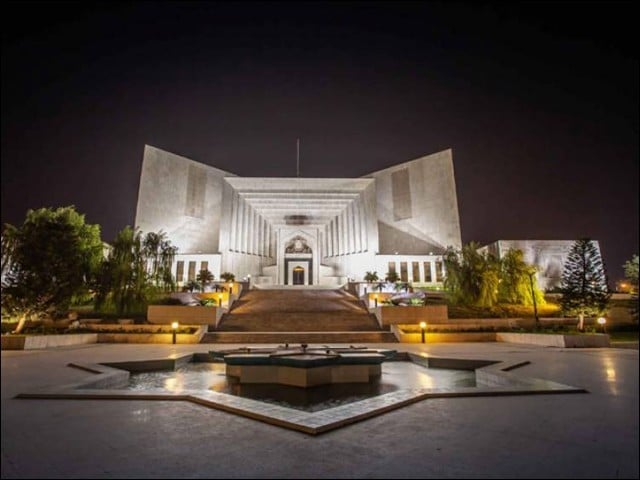Centre justifies military trials, seeks dismissal of petitions challenging them
Court martial, district trial courts have existed concurrently since 1947, federal government tells Supreme Court

Defending military trials of civilians, the federal government on Monday told the Supreme Court that violence against military and vandalism of army installations was a direct attack on the national security of Pakistan, and was therefore prejudicial to security, interests and defence of Pakistan.
To create deterrence in respect of such attacks, our constitutional framework allows perpetrators of such vandalism and violence to be tried under provisions of the Army Act 1952, said the federal government in its reply submitted through AGP Mansoor Awan.
Recent episodes involving Shakeel Afridi and Kulbhushan Yadav are enough (and sufficient) evidence to indicate that foreign powers are constantly working to destabilize the armed forces of Pakistan and weaken our national security, according to the Centre.
In these circumstances, the trial of those accused of violence against the armed forces, as well as the personnel and establishments thereof, under the Army Act, is an apt and proportionate response, in accordance with the existing (and prevalent) constitutional framework and statutory regime of Pakistan, maintained the government.
Submitting its reply, the federal government moved the apex court to dismiss all petitions filed against military trials of civilians in connection with May 9 rioting and vandalism.
In its concise statement, the Centre argued that the law, including the Army Act and Army Rules, provides every possible protection to ensure a fair trial and rights of accused persons.
"...this Court has already found favourably regarding the procedural and substantive protections provided for trial under the Army Act in Ali and Said Zaman Khan cases,” argued AGP Awan on behalf of the government.
Read SC declines to stay army court trials
"...it is also important to mention that several judicial and quasi-judicial forums, independent from the ordinary district courts (civil as well as criminal courts), have been created under authority of various Acts, in a manner similar to Army Act. Further, many such judicial and quasi-judicial forums have special procedural and legal requirements, owing to policy and strategic reasons, and the same ipso facto does not make such forums, in any manner, violative of the principle of due process of law,” he added.
“In view thereof, a trial by court martial does not curtail the rights guaranteed under law, which in any manner may be prejudicial, violative, or contrary to the principles of natural justice, due process of law, and the right to fair trial. As such, court martial merely provides for an efficient judicial structure to entertain, in accordance with law, offences under the Army Act, related to security of personnel and establishments of the Armed Forces of Pakistan," read the statement.
The federal government further stated that both, court martials and district trial courts - civil and session courts - have existed concurrently since the creation of Pakistan in 1947.
"Overview of legal and procedural matrix of court martial and civil/session courts reveal that both the said courts are not 'at odds', inter se; in fact, persons who are tried under the army act undergo a largely similar process in terms of law and procedure, in comparison with the ordinary civil/session trial [sic],” argued AGP Awan.
“Specifically, the provisions of the Code of Criminal Procedure, 1898, relating to, inter alia, framing of charge and recording of evidence are applicable in a trial by court martial, in a manner similar to a trial by a sessions judge,” read the statement, elaborating on the process under which military trials are conducted.
Read more SC moved against PTI era military trials
“Most importantly, trials under the Army Act are conducted, as closely as possible, per the orthodox practices of judicial proceedings, as set forth and established by the superior judiciary of Pakistan. Also, during such a trial, the accused person is provided a 'counsel' of choice, in a manner similar to any other judicial proceeding," it said.
"As result of violence occurred on May 9, the total damage is estimated to be valued at Rs2,539.19 million, including Rs1,982.95 million in losses to military establishments, equipment and vehicles,” submitted the Centre in its reply.
On May 9, alleged workers and supporters of the Pakistan Tehreek-e-Insaf vandalized and set fire to state and army properties and memorials in the wake of the party chief’s arrest by paramilitary troops from the premises of a court in Islamabad.
Over a 100 of these alleged rioters are now in the military’s custody, awaiting trial under the Pakistan Army Act 1952 and the Official Secrets Act 1923.
A number of petitions were filed before the apex court challenging the government’s decision to put May 9 suspects through military trials. Among the petitioners is PTI chairperson, civil society members, senior politician Chaudhry Aitzaz Ahsan and former CJP Jawad S Khawaja. The top court has yet to decide on the matter.



















COMMENTS
Comments are moderated and generally will be posted if they are on-topic and not abusive.
For more information, please see our Comments FAQ